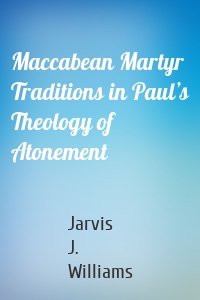Jarvis J. Williams
3 кн.
Christ Died for Our Sins
In Christ Died for Our Sins, Jarvis J. Williams argues a twofold thesis: First, that Paul in Romans presents Jesus' death as both a representation of, and a substitute for, Jews and Gentiles. Second, that the Jewish martyrological narratives in certain Second Temple Jewish texts are a background behind Paul's presentation of Jesus' death. By means of careful textual analysis, Williams argues that the Jewish martyrological narratives appropriated and applied Levitical cultic...
| Автор | Jarvis J. Williams |
Maccabean Martyr Traditions in Paul...
In an age in which scholars continue to produce books on the nature and significance of Jesus's death, books that often assume the Old Testament cult was the New Testament authors' primary background for their conception of Jesus's death, Jarvis J. Williams offers a fresh and novel contribution regarding both the nature of and background influences behind Paul's conception of Jesus's death. He argues that Paul's conception of Jesus's death both as an atoning...
| Автор | Jarvis J. Williams |
Galatians
Jarvis Williams' commentary on Galatians is a commentary of one of Paul's most rhetorically charged and polemically sharp letters. Williams writes a commentary of the letter, not a commentary of commentaries. He grounds the letter in grammatical-historical exegesis, seeking to help readers understand Paul's Greco-Roman and Second Temple Jewish context of the letter. Additionally, the book seeks to move from exegesis to application in a few places in the commentary. The strength of...
| Автор | Jarvis J. Williams |




